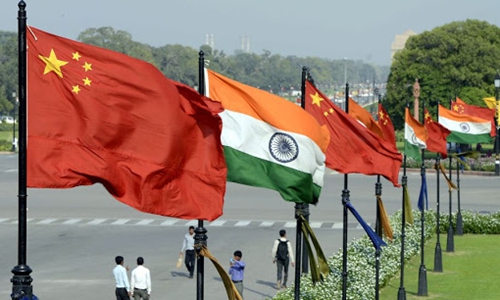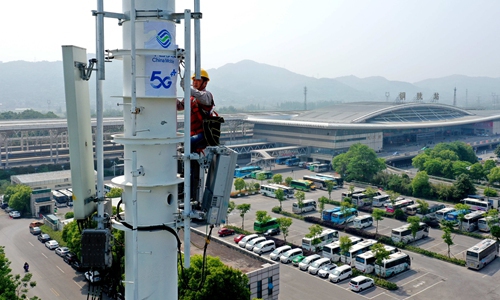
An Indian shopkeeper sprays a disinfectant on customers' hands as they stand on marked circles to buy alcohol from government-run liquor shops in Ghaziabad, India in May. Photo: AFP
As nationalist sentiment in India has risen after the recent border clash, boycotts of Chinese items and mobile apps by Indians may hamstring Chinese businesses there, but the impact will be temporary as both sides need each other to achieve growth, analysts said.
The comment came after the "Uttar Pradesh Special Task Force" asked its officers and employees to uninstall Chinese-made apps from their phones and those of their family members, The Times of India reported on Saturday.
The Indian side used the word "theft" when referring to the Chinese mobile apps, which they claimed had the ability to steal Indian users' personal data, according to the local media reports.
The allegations target Chinese apps such as Tik Tok and WeChat, whose business operation in India may face negative impact as nationalism is rising in the country.
Blocking Chinese products and services has become a social phenomenon in India, which will create hurdles to increasing the number of users in the market, Xiang Ligang, an industry analyst told the Global Times on Sunday.
As Chinese technology companies have invested in many upstart firms in India in recent years, operational risks may affect their investment.
The 'Remove China Apps' software that enables local phone users to delete all Chinese apps on their mobile phones has already affected Chinese businesses that wish to enter the Indian market.
However, the impact is not expected to last for long as the Chinese apps are advanced in terms of providing customer-oriented services based on big data, which has proven to be a great success in India, experts said.
TikTok, which is popular in India with more than 200 million users out of the country's 1.3 billion population, is approaching Whats App's 400 million users, the head of TikTok's India operations, Nikhil Gandhi, said in a previous interview with the Financial Times.
Qian Feng, the director of the research department at the National Strategy Institute of Tsinghua University, told the Global Times on Sunday that rising nationalism targeting Chinese products and apps will sour China-Indian relations further.
Today, 18 of India's 30 unicorn companies have been funded by China. More than two-thirds of Indian companies investing in China have made steady profits with a cumulative investment of up to $1 billion, according to Qian.
Since the outbreak of COVID-19 this year, China-India economic and trade cooperation has been hampered by curbs on the movements of people and India's tightening of the foreign investment approval system.
"The border incident makes matters worse. The investment, operation and layout of Chinese enterprises in India are affected to different degrees," Qian said.



